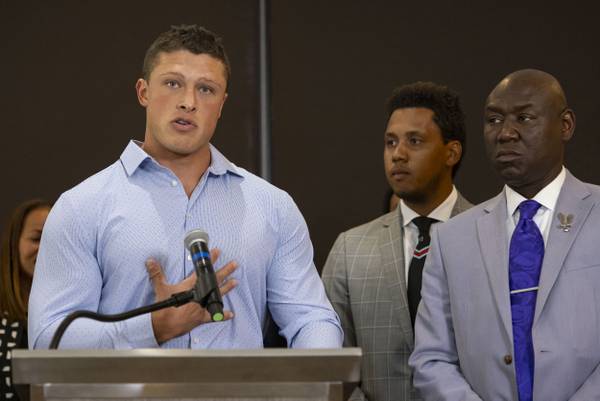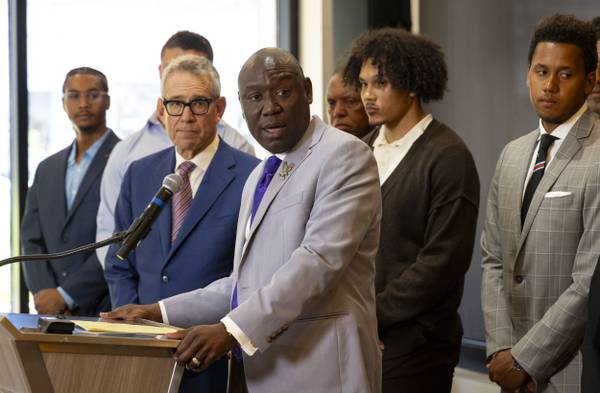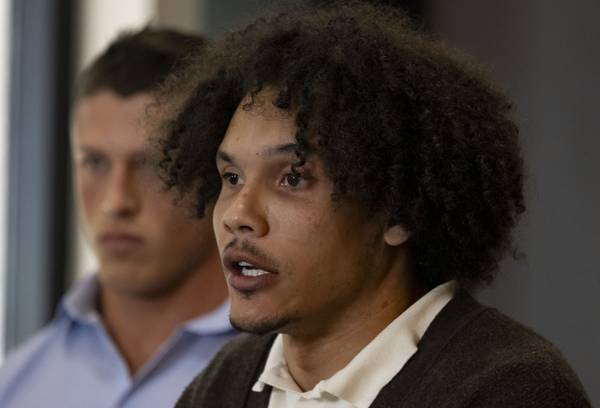“All we wanted to do was play ball,” Simba Short said Wednesday morning as he stood behind a lectern with three other former Northwestern football players.
It was a reasonable request.
They had been recruited to Northwestern to do just that, after all, and were sold on the program by the coaches who brought them in.
But here they stood in solidarity, describing the psychological and emotional pain they endured from entering a football culture described Wednesday as “toxic” and “systemic.” A game they’d played as little kids was now a reminder of a traumatic experience they couldn’t forget.
Short joined former Wildcats players Lloyd Yates, Warren Miles Long and Tom Carnifax at a downtown news conference held by attorneys Benjamin Crump, Steven Levin and Margaret Battersby Black. They announced an impending lawsuit against the university over the alleged hazing that led to the firing of head coach Pat Fitzgerald and has tarnished the reputation of the school and its athletic department.
Like thousands of high school athletes every year, the four former players went through the painstaking recruiting process, sorted through the pluses and minuses to find the right fit and ultimately accepted the offer from Northwestern, a fine academic school in an iconic power conference with a revered head coach.
If all went well, they would have a great education to fall back on even if their dreams of playing professionally didn’t pan out. There seemed to be no drawback to playing college football at Northwestern — until they were introduced to a culture that allegedly forced them to endure physical and sexual abuse that would change their outlook on football, the university and life.
Crump said 15 former NU athletes, mostly football players, are part of the lawsuit that has yet to be filed. He called it a “civil rights” issue.
Yates, a former Oak Park-River Forest student, came to Northwestern in 2015 with what he called “100 years of legacy” between his family and the school, starting with his great-grandfather and including his father and older brother. He grew up attending games at Ryan Field, watching his brother lead the drumline and “imagining how amazing it would be to follow in my family’s footsteps and put on that Wildcat jersey.”
But that legacy was meaningless when he allegedly became another victim of organized bullying disguised as a team bonding ritual. Now he no longer can even watch football, a reminder of the abuse he experienced as a student-athlete at Northwestern.
One of many questions stemming from the hazing scandal is why no one spoke up sooner. Only after a whistleblower’s allegations in late 2022 were investigated and summarized by the university in a July 7 report — which offered few details and only a wrist-slapping, two-week summer suspension for Fitzgerald — did the story get scrutinized.
The whistleblower’s detailed account of the abuse to The Daily Northwestern on July 8 blew the lid off the scandal, forced NU President Michael Schill to backtrack on his original sanction for Fitzgerald and ponder a harsher penalty, and gave others — including the four players who spoke Wednesday — the courage to provide what one called “validation” of the whistleblower’s allegations. They hoped other victims would follow suit.
“We lived in fear,” Short said. “Don’t live in fear. … Don’t be silent. There is a support system here for you. We hear you and we love you.”
Carnifax said his father never understood when he told him how much he “hated” his experience as a player.

“I blamed myself for a lot of it, (thinking) ‘I’m not good enough, there is a reason why I’m not playing,’” he said. “Because I believed coaches (that) I wasn’t good enough, or I’m not worthy because I was hurt. I told him that as my way of showing the trauma because he didn’t believe me. It angered me when this first came out. The first thing he said was ‘Sorry.’
“It’s hard to explain to (people) what we went through. We know because we saw it for four years straight. The words we have to best describe it are not even touching a fraction of it.”
Yates said there was a “code of silence” among NU players, who worried that saying something could cost them playing time or even their scholarship. Crump said the players feared retaliation if they tried to speak out against the hazing.
“Like Tom said, you end up blaming yourself, but you were the victim,” Crump said. “That’s the psychological trauma that comes from hazing and physical intimidation and retaliation and certainly sexual abuse.”
The players understand that by speaking up Wednesday, they are opening themselves up to criticism and more abuse on social media. But they hope by doing so they encourage other victims to do likewise.
Yates said they were “physically and emotionally beaten down, and some players have contemplated suicide as a result” of the hazing.
“All of it was humiliating,” Yates said of being held down and dry-humped by teammates, forced to perform football acts while naked and other methods of hazing. “As an athlete, it’s something we hear about coming in. We don’t know what it looks like, but it’s something you say: ‘That’s not going to happen to me. I’m going to fight back. I’m going to do something. I don’t play with that kind of stuff.’
“But when it happens, it’s uncontrollable. You’re overpowered, you’re dominated by the culture. And that’s one aspect. Another aspect is the sexual nature — nudity and performing acts while being nude that is so normalized in the culture. Coming from high school, we never did any of that stuff.
“We just thought that this was part of playing college football, playing (in the) Big Ten, and we just wanted to be accepted, to fit in and we wanted to earn trust and respect. And if you went against that, you were labeled … and it warranted further abuse.”
Chicago Tribune Sports
Weekdays
A daily sports newsletter delivered to your inbox for your morning commute.
Yates said “normalizing the culture became obsessive,” and the hazing was “so entrenched … that even some of our coaches took part in it.”

When I asked if any of the four players knew whether Fitzgerald was involved or could detail how, Crump said the players said the culture was “rampant.”
“If the coach or coaches didn’t know, it would have to be malfeasance,” he said. “It would have to be they were asleep at the wheel. I mean, you can’t have these many players saying we experienced the same things over these numbers of years, and coaches who have been there for years say, ‘We don’t know anything about it.’”
Fitzgerald’s attorney, Dan Webb, issued a statement about the allegations made in the news conferences held by Crump and another firm representing an unnamed player in a lawsuit, calling them “broad-based, imprecise and sweeping.”
“No arguments were made that would present any substantive, detailed, factual allegations, let alone evidence, about Coach’s Fitzgerald’s conduct,” Webb said.
Yates didn’t name Fitzgerald but said he found it “hard to believe (coaches) were not aware of what was taking place” in the locker room and training facilities.
“A lot of coaches took part in it in many different manners, and explicit behavior,” he said. “It was so explicit, it was loud, it took place in close proximity to (where) a lot of the staff, trainers would be located. So it’s kind of hard to take a blind eye.”







